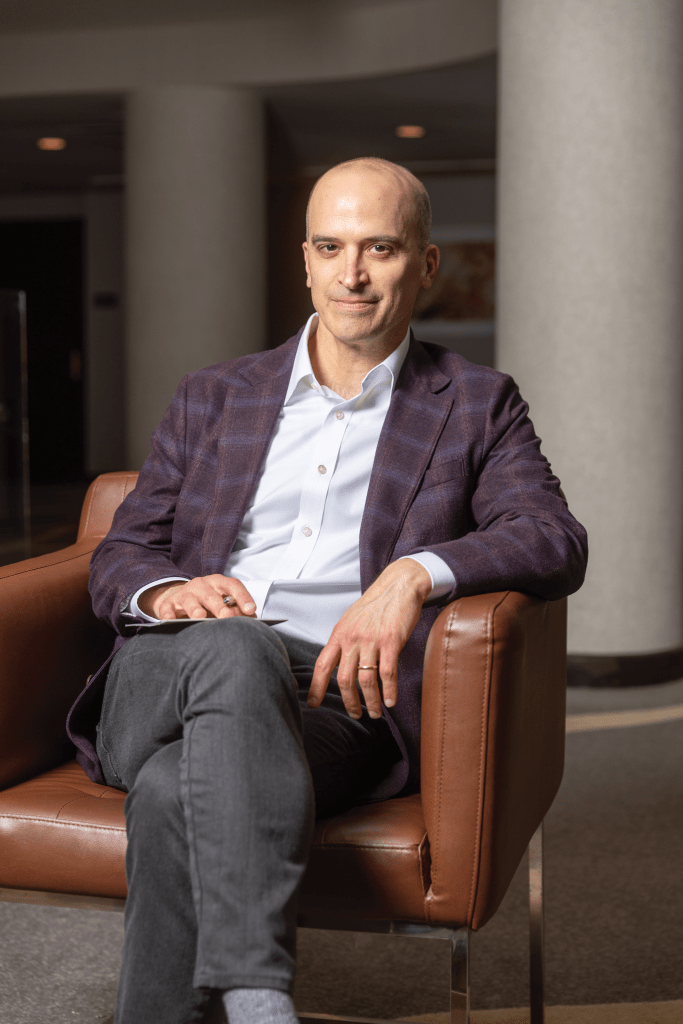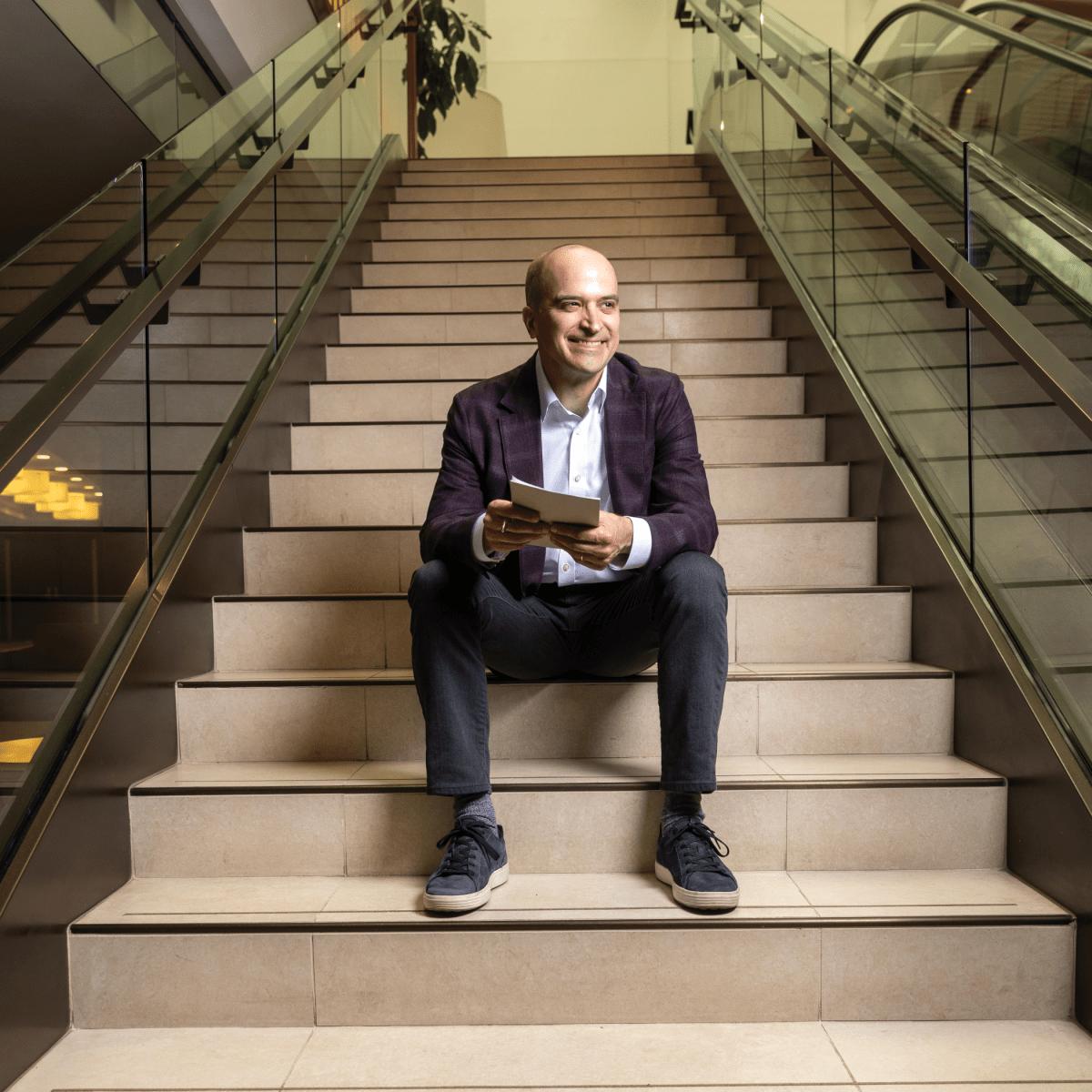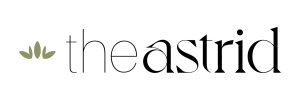David Leonhardt is a morning person. He feels freshest writing when the sun is rising and often goes to a coffee shop in Bethesda, where he’s lived for more than 15 years, to work on The Morning, The New York Times’ flagship daily newsletter that he runs.
A prolific writer, avid reader and deep thinker, Leonhardt has a talent for deconstructing complicated—and occasionally dry—issues and turning them into digestible and entertaining stories for a wide audience.
“I love being a journalist, but I constantly try to put myself in readers’ shoes,” he says. “What I try to do is say, ‘What are the things that people find confusing in the news? What are things that are more important than the attention they’re receiving?’ I try to think of myself as a representative of readers.”
Leonhardt loves using multiple methods to illustrate points in a story. Take, for example, his article on “How Peer Pressure Affects Voting” that ran in The Morning on March 22, one of two days Bethesda Magazine interviewed him that month. Typical of a piece in the newsletter, it is conversational in tone, uses infographics, and quotes an array of outside-the-Beltway sources rather than just the usual boldface names.
“Many Democrats have imagined people of color to be a uniform, loyal, progressive group, defined by their race,” Leonhardt wrote. “They are not. The party will have a better chance to win their votes if it spends more time listening to what these voters believe.”
It was simply put, with facts and stats to back up his take and a takeaway that leaves no ambiguity. That approach has worked for Leonhardt since he joined the Times a quarter-century ago.
His success was reinforced when he won the Pulitzer Prize for commentary in 2011. The committee cited “his graceful penetration of America’s complicated economic questions.” Yet Leonhardt is just as comfortable talking Walt Whitman High School sports (he’s a big fan of the Bethesda school’s teams) as he is stagflation or the gold standard. That lack of pretension shines through in his writing and has brought him to the loftiest heights in American journalism.
Bethesda Magazine spoke with Leonhardt via Zoom and phone in March. The interview has been lightly edited for clarity and length.
What’s the goal of The Morning?

I spend a lot of time thinking about that. I think we have a few goals, and they’re connected. The Morning is free. You don’t need to have a New York Times subscription to get it. Most of our readers do not have a subscription. There are two important things to know about people who don’t have a New York Times subscription: One, they can’t click a lot of the links that we put in, and two, on average they probably follow the news a little bit less closely than someone who does have a subscription. That actually fits quite nicely with another kind of theory that I have for the newsletter, which is I think there are a lot of readers out there who are really smart and really interested in the news but are frustrated that the journalism they read sometimes feels like it’s written for experts. It uses too much jargon. It assumes that you have background knowledge about a story. It places too much emphasis on whatever happened yesterday as opposed to trying to put things in a larger context. I think most readers want to have a sense of where the story is headed. So we really try to write for those kinds of readers. When I think about our audience, I think about a very smart person who has very little background knowledge on any given story.
Do you remember the biggest story that you covered as editor-in-chief for the Yale Daily News?
There were two. We did a bunch of investigations about allegations of sexual harassment of students by professors. Those stories were really hard to do for obvious reasons. They involved trauma for people…. We also had a presidential search at Yale while I was there. They spent a whole year looking for a new president, and we thought we had gotten the scoop on who the new president was going to be. But the sources were anonymous. We were printed by the New Haven Register. Of course, their print run was a lot larger than ours, so it started well before ours. So when we got to the Register that night, we were able to get a copy coming off the presses. Our first reaction was excitement because they didn’t have the story. And our second reaction was a low-level terror. What if we had it wrong? We didn’t have it wrong. We had it right. Getting it a day early isn’t important in some larger social sense, but it’s part of the thrill of journalism. You’re trying to get information that people don’t want you to have.
When you first came to Washington as a Post intern in 1994, what was the biggest adjustment for a kid from New York?
I loved it from the get-go. I found Washington really exciting because I was, and am still, interested in politics. I also liked that Washington has an intimacy to it that New York doesn’t. It’s such a smaller city. In some ways, it’s so much more accessible. New York is maybe the most dynamic city in the world, but it’s not that livable. A lot of places are extremely livable, but they don’t have anywhere near the food—which is really important to me—or the culture that this area does.
You joined the Times in ’99. How was being a reporter back then different than it is now? Or should I say, are there any similarities from back then to now?
It’s a great point. The basics of the job are the same. We try to figure out information and explain it. We’re basically the readers’ representative out there, right? That hasn’t changed.
Obviously, the internet is the biggest difference. Now at the Times we don’t write things the way we used to, which [was] the sort of reverse pyramid style. We don’t write headlines that have to fit in particular [spaces]. We try to be much more conversational with people.
I do still love the similarities. One of the things I love about The Morning is that it comes out once a day. So like the newspaper, but unlike a lot of digital coverage, we’re not trying to publish 30 different stories on what happened in the stock market or in Gaza or Ukraine today. We’re trying to tell you the most important things that you need to know.
You won the Pulitzer Prize for commentary in 2011. How were you informed that you won?
The way it works is the ceremony is on a Monday, but they make the decision on [the previous] Friday. And I don’t know if this is just the big papers that have connections with Columbia University, but they figure out a way to give people a heads-up on Friday. I had known I was afinalist, and actually it was my second straight year of being a finalist. The previous year my direct boss, the business editor, had called me that Friday to say I hadn’t won.
I had gotten it in my mind this next year that I wasn’t going to win either. So I was expecting that call from my boss again. My cellphone rings and it’s Bill Keller, who [was] the top editor. He said, ‘Hi, David. It’s Bill.’ I got this sort of jolt of adrenaline hearing his voice because I knew that the boss called people [who won the Pulitzer]. Lots was going through my mind. This could be a pity call still. I walked into a hallway in the Washington bureau of the Times and I nervously said, ‘Oh, hi, Bill. How are you?’ He said, ‘I’m not as good as you are, because you just won the Pulitzer.’ And then [my family and I] celebrated by having pizza at [Pete’s New Haven Style Apizza] on Wisconsin Avenue.
Is it hard to implement change at the Times? From an outsider’s perspective, I imagine that there are a lot of egos and internal politics among the other business concerns that you’re talking about.
Yes. It is hard, but I’m confident that it is hard to implement change in almost any large, highly successful organization. Because it should be hard to implement change, in some ways, because there’s a reason why these organizations have been so successful, and you don’t want to be undermining them.
What I have found repeatedly in my career is the best way to make change happen here is to start something new and have it be different. I’ve now done that multiple times. When I became a business columnist in 2006, I wasn’t taking over a column from someone else. It was a brand-new column that the business editor started. He wanted more conversational, easy-to-follow coverage of economics. He didn’t go to the people who are already doing it and say, ‘You all need to change what you’re doing.’
And then in 2014, a team of people and I created The Upshot, where we found new ways to [tell stories]. You didn’t have to have a chart to go with an article; you could just make an article that was a chart. We wrote headlines in more conversational ways back when that was innovative. We published stories at 9 a.m. because that’s when most people are online, rather than at 6 p.m. because that allows them to go into the print newspaper.
The Morning is the third example. When you do new stuff, some of it works, some of it doesn’t. If you go back and look at the early Mornings, a bunch of the stuff we did didn’t work, so we stopped doing it. But a lot does work. It actually can be easier to change the place in a bottom-up way rather than a top-down way.
We live in such a fractured country politically, and many people get their news from partisan sources. How does that impact your work at the Times, which traditionally has been seen—fair or not—as a liberal outlet?
I think it’s really vital for us to be independent—and not just in a partisan sense. I actually don’t think we struggle with that. The New York Times has broken more stories that have done career damage to Democrats, in part because most politicians around New York are Democrats. So whether it’s [former New York governors] Andrew Cuomo or Eliot Spitzer, I don’t think we have a problem covering tough news about Democrats. In fact, a lot of readers thought that we over-covered Hillary Clinton’s emails, for example.
I think where it can be harder, if you just think about our demographics, most of us working at The New York Times are college graduates who live in the major metropolitan areas of New York, Washington or a handful of other cities. Those are people who are living in overwhelmingly liberal milieus. So I do think it’s really important that we be particularly rigorous about interrogating assumptions that might come from liberal America, given that many of us spend more time surrounded by liberal America than conservative America.
I view that as a crucial part of what The Morning does. We got a fair amount of attention for raising real questions about whether COVID precautions were going too far and whether it was harming kids to be out of school for so long. More recently, my colleague German Lopez wrote pieces saying crime is really rising. I think a lot of liberals were trying to claim, ‘No, no, it’s all just a Fox News claim.’ But no, crime was really rising. And so we wrote that. And I’ve written some pieces recently that have explained how the Biden administration’s policies have contributed to the surge in migration at the border.
We’ve also written tough pieces about conservatives. So we do it both ways, but I think it’s particularly important to make sure that we are asking tough questions about liberal assumptions.
The Times ended 2023 with 9.7 million digital-only subscribers. Based on my unscientific conversations with colleagues and friends, as many people get it for the recipes and the games as political coverage. Is that something you envisioned happening?
I think it’s great, and I actually think it is in keeping with newspapers’ histories. Journalists like to think that the heyday of local newspapers was about coverage of city hall, but really it was mostly about coverage of local sports teams, obituaries, comics and classified ads.
Yes, people want to be informed. If all they wanted was games, there are many places they could find games. But they also want to be delighted and entertained, and they want highly useful information, like the kind of information that our great cooking staff gives people. We actually think it is very much in keeping with The New York Times’ history, when you think about our crossword puzzle back in the print newspaper, when you think about how popular our print recipes were, when you think about how popular our bridge column used to be.
Are you a Wordle or Spelling Bee player?
I am a daily Spelling Bee player. Very, very satisfying to get the pangram. And I play most of the other games a little bit less regularly, including Wordle and Connections. My wife and I do Spelling Bee together, usually in the morning with a cup of coffee. I am satisfied when we get to genius, but she’s better at it than I am. On the rare day where we get to genius without the pangram, her attitude is we haven’t solved it.
Are you concerned with the state of journalism when it comes to local news?
I am concerned with the state of local news. I’m lucky that I live in the rare metropolitan area where a national news source is also a local news source, which is The Washington Post. One of the things I read every day is the Washington Post sports section. I read Bethesda Magazine. I read Washingtonian magazine.
The New York Times has a business model at this point that looks pretty solid. And even if we were to do a bad job over the next 20 years, the idea that there’s a national audience of people who want high-quality news, that’s now been proven.
There isn’t a model for local journalism at this point, and I am deeply worried about it because democracy functions much better when we have journalists covering local school boards and local government and local companies. Political scientists have shown that when local newspapers leave, corruption goes up, polarization goes up, voter turnout appears to go down.
I’m glad to see, though, that there seems to be a lot of energy around trying to find new models, like nonprofit news sources like The Baltimore Banner. So I’m a little bit hopeful, but it’s a huge problem.
You’ve worked for the Times for 25 years, and you’ve seen dramatic change at your publication and in the industry. Do you care to hazard a guess on what the state of journalism will be at the Times and elsewhere 25 years from now?
I would guess that 25 years from now The New York Times will be very strong. I would guess we would have substantially more digital subscribers than we now have. I would guess that the technology will make some leap that we can’t even fully fathom right now. So maybe it won’t be on our phone. Maybe it’ll be the kind of holograms people imagined where you’ll have a ring that basically projects something onto the table where you’re sitting. I have no idea. And although it’ll make me very sad because I love print, I would guess that there will not be a daily print newspaper in 25 years. As a journalist, actually, that doesn’t bother me because what I care about is that people are reading what I’m doing, not where they’re doing it. But as a reader, I still love print because print never runs out of battery. You can’t have alerts pop up and distract you with print.
You mentioned that restaurants were important to you. What are some of your favorites in our area?
Oh, I love this question. I love Vace for takeout pizza. We spend a lot of time eating Chinese food in Rockville. Sichuan Jin River in Rockville. We love Olazzo in Bethesda. We love food.
This story appears in the July/August edition of Bethesda Magazine.



